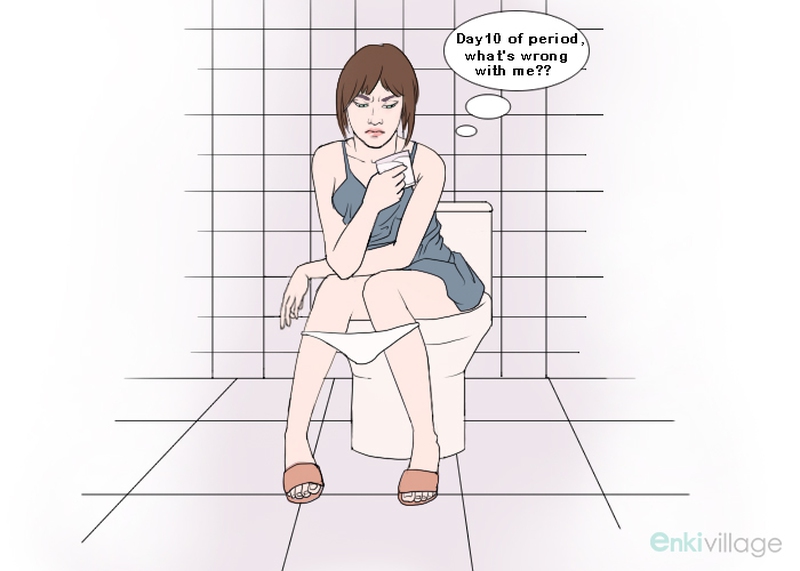The average duration of menstruation is 4 to 6 days, during which a women sheds around 40 ml of blood. The symptoms faced by most of the women are the same, however, the heaviness of the flow, the duration of the period will vary. In a healthy menstrual cycle, periods occur every 21 to 35 days with an average of 28 days. Sometimes the periods extend longer than normal, which is when you hear the problem – my period won’t stop. What needs to be done in such a situation?

My Period Won’t Stop, Is It Normal?
There are various reasons why period won’t stop. It is abnormal when the following symptoms are seen:
When the blood loss exceeds 80cc or 5 tablespoons
When one tampon or sanitary pad is used up in an hour and this situation is happening for several hours together
You require double sanitary pad or are required to use both a tampon and a pad
You are required to change during the night
The menstrual flow consists of large blood clots
The periods continue for more than a week
The heavy flow prevents you from participating in activities
You have symptoms like fatigue, shortness of breath, dizziness and paleness, which relate to anemia
Bleeding or spotting between periods, when you are pregnant, after having sex, or after you have achieved menopauses
If you have severe pain, fever, abnormal discharge, or foul smelling discharge
You have unexplained weight loss or sudden weight gain
If you find discharge from your nipples, have unusual hair growth or new acne
If your prolonged period is accompanied by the above mentioned symptoms, you should contact a doctor to find why and get relief.
My Period Won't Stop, Why?
Hormonal Imbalance
Hormonal imbalance of estrogen and progesterone can cause increased bleeding and is usually seen during menarche and menopause. Ovarian disorders can cause hormonal imbalance
Menopause
Menopause can cause prolonged bleeding. Unless it is excessive, you can let it stop on its own, or consult a doctor. Practicing yoga, eliminating processed foods from diet or an acupuncturist can help relieve symptoms of heavy bleeding.
Internal Bleeding
Although not very common, internal bleeding can be the reason why period won’t stop. This happens when blood is unable to clot inside the body. The other symptoms are bloody stools or vomit, dizziness or fainting. A doctor should be consulted.
Other Causes of Prolonged Period
Another reason why my period won’t stop is the presence of uterine polyps which grow from the walls of the uterus and are mushroom-like.
Presence of non-cancerous fibroids in the uterus or tumors, which is usually seen in child-bearing years.
Middle aged women can suffer from adenomyosis, which happens when the glands of uterus get embedded in the muscular lining of the uterus.
Use of IUDs as birth control measures and blood thinners
Ectopic pregnancy, a miscarriage, or infection or cancer in the uterus, fallopian tubes and other reproductive organs can cause heavy bleeding.
How to Deal With Prolonged Periods
Leave It Alone
If the prolonged periods do not interfere with your daily routine, you can leave it alone. When there is no underlying serious cause associated with it, you can start to accept it. You should however get yourself checked for anemia periodically and take iron supplements if required.
Track Your Period
It is a good practice to keep note of your periods or any other bleeding you have, which will include the following:
Start date and end date of periods
How heavy the flow was, you can list the number of pads or tampons used and how soiled they were
If you experience bleeding between periods or after sex
Any other symptoms you experience during this time
Take Medications
When you have the feeling that my periods won’t stop, you can take some medications to get some relief.
Hormonal tablets can be taken to regularize the bleeding, like contraceptive pills and Danazol
Although the flow does not decrease, taking progesterone can regularize periods
Taking tranexamic acid, which is a non-hormonal treatment, can reduce the blood loss by half
To reduce blood loss by one third, you can take NSAIDs
A hormonal contraceptive coil (Mirena) can be used as an alternative method, and it is suitable to most women
Turn to Surgical Procedures
The surgical options that can reduce the blood loss and duration of prolonged periods are:
Dilation and Curettage, which involves surgical widening of the cervix and scraping off the internal lining of the uterus
Hysteroscopy, which involves removal of fibroids and other growth from the inside of the uterus with a thin and long scope
Endometrial resection or ablation, which involves the destruction or complete removal of the internal lining of the uterus. Once this procedure is done, the woman will not be able to have baby
Hysterectomy is the complete removal of uterus and cervix. A woman cannot have baby once this surgery is done

View All Comments /Add Comment